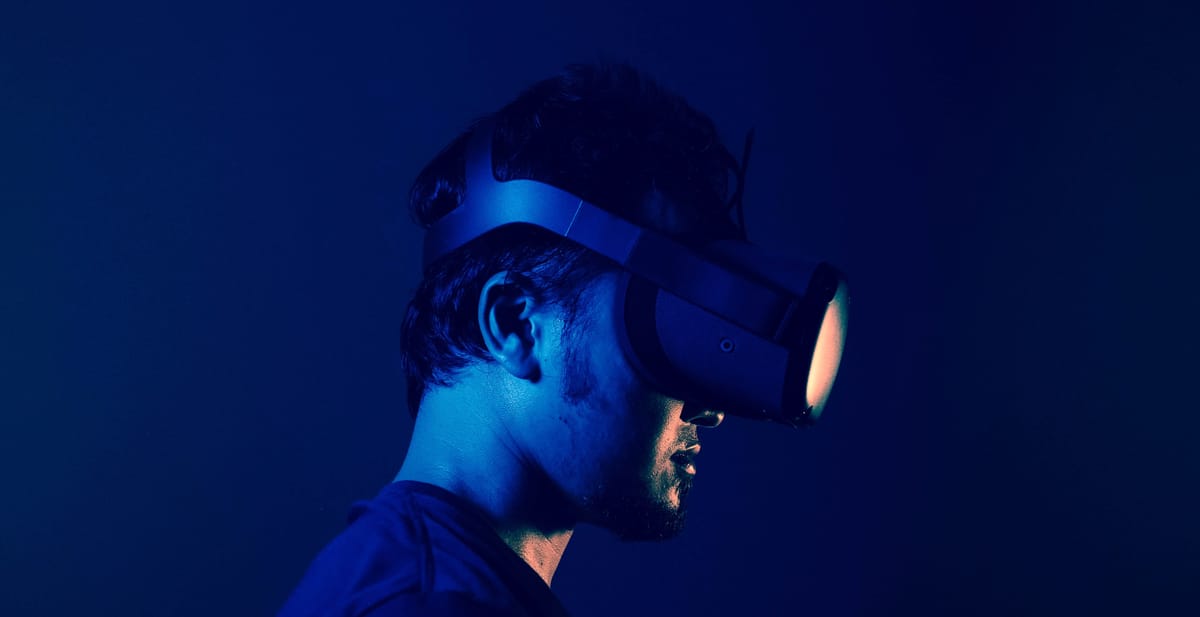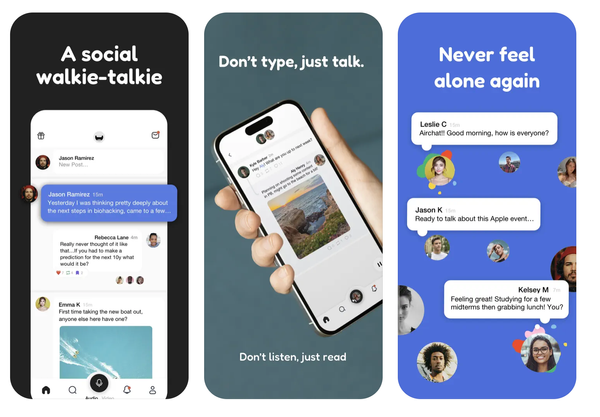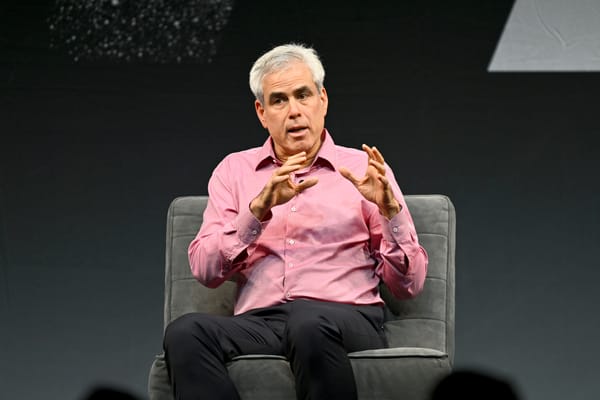Is Facebook cornering the VR market?
A recent shopping spree is giving some folks Instagram-in-2012 vibes

Imagine that, over the past year, Facebook had managed to acquire the battle royale game Fortnite, the kid-focused game creation engine Roblox, and the best-selling game of 2020, Call of Duty: Black Ops Cold War.
For many reasons, such a spree of acquisitions would never happen. One of the biggest is that antitrust scrutiny has made it increasingly difficult for Facebook to acquire anything that resembles a social network. It was more than a year ago that the company bought the moribund GIF search engine Giphy, which had few prospects for success as a standalone company; the United Kingdom’s competition watchdog has so far blocked the deal from closing, warning the acquisition would somehow harm Facebook’s competitors.
And yet if you look at the virtual reality landscape, Facebook has made a series of acquisitions that are roughly analogous to the fictional shopping spree I describe above, if on a much smaller scale:
- Last week, Facebook bought Big Box VR, maker of the battle royale game POPULATION: ONE. The shooter has a structure and a “season”-based business model similar to that of Epic Games’ Fortnite.
- The week before, Facebook bought Unit 2 Games, maker of the Crayta platform. Crayta lets users make and share games in a fashion that mirrors Roblox, the fast-growing game platform that went public earlier this year.
- In 2019 Facebook bought Beat Games, maker of the hit game Beat Saber. Beat Saber was the most popular VR game on the Oculus platform by far when Facebook bought it, and it remains a bestseller today with more than 4 million copies sold.
The company’s other VR studio acquisitions include Sanzaru Games and Ready at Dawn.
Alex Heath, a reporter at The Verge who has closely covered the rise of AR and VR technologies, observed on Twitter recently that Facebook’s acquisitions in the space resembled its most famous bets on nascent technology from years ago: the purchases of Instagram and WhatsApp, which helped the company cement its position as the dominant player in social networks.
“Facebook is going to probably have a near-monopoly in VR software before it even matters,” Heath tweeted. “Facebook will have literally reinvented itself for a new paradigm shift in computing by the time regulation gets around to addressing it in its current state.”
Whether or not you think Congress should intervene to regulate tech acquisitions, it’s undeniable that the process moves slowly. Facebook bought Instagram in 2012 and WhatsApp in 2014; a congressional antitrust inquiry didn’t begin until five years later; and a bill that would require heightened scrutiny of tech platform acquisitions was not introduced into Congress until … Friday. (OK, fine, the insurrectionist Sen. Josh Hawley introduced to ban all platform acquisitions, period, in April, but his bills are better thought of as Fox News op-eds than as serious efforts to regulate the industry.)
I think the Federal Trade Commission should be more skeptical of tech giants acquiring their direct competitors, but I’m not sure a bill that defaults to banning acquisitions is the best approach. Acquisitions are part of the lifeblood of Silicon Valley, and the money that they return to investors gets re-invested in the next generation of entrepreneurs and technologies. You can encourage competition in lots of ways without banning M&A. And in any case, it’s hard to imagine a bill like this one garnering much support from Republicans, Hawley’s bill notwithstanding.
At the same time, let’s say you believe Facebook’s acquisitions of Instagram and WhatsApp set back the consumer internet for a few years — until TikTok emerged, anyway. Wouldn’t you want to apply as much scrutiny to Facebook’s current shopping spree as you’re applying to moves it made as long as nine years ago?
The answer to that question likely depends on large you think the market for virtual reality headsets and its attendant software ecosystem will someday become. Currently the market is small — Facebook’s Oculus platform had sold fewer than 10 million units as of January. The PlayStation 4, by contrast, has sold 114.93 million units over its lifetime; Apple sold nearly 80 million iPhones in the last quarter of 2020 alone.
If you think VR will grow to roughly the size of a major console gaming platform, maybe you’re not concerned how many studios Facebook is buying. Console manufacturers buy game studios all the time — Microsoft’s acquisition of ZeniMax Media, owner of Bethesda Software and its many popular franchises, was last year’s mega-deal in the space — and no one seems to have too many concerns that any one console is developing a monopoly.
If, on the other hand, you think Oculus could grow to a size more closely resembling a major desktop computer manufacturer, like Dell, perhaps you would eye its acquisitions with more scrutiny. To lay my cards on the table: I think it eventually will.
Facebook still hasn’t released sales figures for the Quest 2 headset, and I’m told PlaystationVR has sold more units overall. But we know that Quest 2 drove a 156 percent year-over-year increase in Facebook’s non-advertising revenue in the last quarter of 2020. Even on a relatively small revenue base, that might make VR Facebook’s fastest-growing business.
Everywhere you look, you find signs of Facebook’s growing confidence in its VR platform. CEO Mark Zuckerberg has given frequent interviews on the subject over the past 12 months, among other things positioning AR and VR as an enterprise software platform as well as a place to play games. The company has hired more than 10,000 people to work in its Facebook Reality Labs hardware division.
In short, there’s more evidence that VR will be huge amid Facebook’s run of acquisitions today than there was evidence that Instagram was going to be huge when Facebook bought it in 2012, before the app had even 50 million users.
None of that is to say that I think VR will overtake smartphones as the world’s biggest computing platform. And it’s also clear that Facebook has real competition as it tries to build out the mixed-reality future. Snap is also building impressive hardware and software in that space, focused on its Spectacles glasses and growing developer ecosystem around them. Apple, which is working on a headset of its own, has made at least four acquisitions of mixed-reality companies in recent years itself.
It may also be that Epic Games makes Fortnite the Fortnite of VR, and Roblox makes its platform the Roblox of VR, and Facebook’s efforts in that space wither.
Facebook told me its reasons for acquiring so many game studios are straightforward: it wants to accelerate the growth of a still-nascent industry by ensuring top-flight gaming experiences are widely available. It’s a very small player in the gaming industry, the company said, but hopes its acquisitions will be good for both developers and users.
“That’s all true — but it doesn’t doesn’t mean it isn’t going to be an issue in six or eight years,” Heath told me over the phone Wednesday. From Heath’s perspective, the more consequential aspect of Facebook’s acquisitions is that it will tie up a significant amount of VR talent at one company for at least four years while their options from the acquisition vest.
“There are not that many companies doing this,” Heath said of the VR industry, “And the people that are good either already work at Facebook or they’re buying them.”
None of this will much matter if the VR industry fails to live up to its most recent round of hype. And failing to live up to the hype is perhaps the signature feature of the VR industry for its entire lifespan so far.
But if VR becomes a part of our daily workflow as well our daily entertainment, and Facebook becomes the market leader in that space, we may be in for another global conversation about how a tech giant successfully used its market power to take over an adjacent industry. If that’s to be the case, it strikes me that the time to have that conversation is now — while the foundation is still being laid, one minor-seeming acquisition at a time.
Elsewhere: Facebook said Wednesday it will begin testing ads in Oculus headsets.
The Ratio
Today in news that could affect public perception of the big tech companies.
⬆️ Trending up: Facebook developed a new method to reverse-engineer deepfakes and track their source. While still in the research stage, “the work is useful as it could help Facebook track down bad actors spreading deepfakes on its various social networks.” (James Vincent / The Verge)
Related: A new AI tool called Conflict Alerts is designed to detect “contentious or unhealthy conversations” in Facebook Groups, and then ping moderators so they can intervene. Another new feature called “admin assist” offers automated comment moderation. (James Vincent / The Verge)
⬇️ Trending down: A “smart pricing” algorithm intended to reduce discrimination against Airbnb hosts of color wound up increasing the disparity in their earnings. The company’s “anti-discrimination team” is just five people and does not include any Black employees.(Hayden Field / Morning Brew)
Governing
⭐ The Indian government continued its saber rattling against Twitter this week, warning that the company had “lost” its safe harbor protections that ensures it isn’t held liable for user posts. But in reality, that question is left to the courts. Here’s Nilesh Christopher at Rest of World:
The move is the latest in a series of attacks on Twitter by the government of Narendra Modi, culminating in a widely covered police raid on the company’s offices in May. However, legal experts told Rest of World that the latest threat is essentially hollow, and that it is the courts, not the government, that have the power to decide whether or not Twitter should keep its safe harbor provisions.
“I would like to clearly state: the IT Act, IT Rules do not contain any power for the process for grant[ing] or revocation of an ‘intermediary status’,” said Apar Gupta, executive director of the Internet Freedom Foundation. “When companies like Twitter are prosecuted, they will seek protection before courts. Hence, at that time, courts will decide, not the government if it is an intermediary.”
⭐ A look at the effect of the ban on Twitter in Nigeria, where citizens are threatened with prosecution for tweeting via VPNs. Government efforts to crack down on the platform accelerated after it was used to organize country-wide protests of police brutality. (Nelson C.J. / BuzzFeed)
Apple would be forbidden from pre-installing its own apps under a package of bills introduced into Congress last week. US Rep. David Cicilline “said the self-preferencing prohibition would also apply to Amazon Prime subscription service because it disadvantages some sellers who rely on the e-commerce platform.” (Rebecca Kern / Bloomberg)
Amazon’s plans to build a regional headquarters in Cape Town, South Africa drew protests on Wednesday amid criticisms that the site is important to indigenous people. “There are now 50,000 objections from various parties, according to Tauriq Jenkins of the Goringhaicona Khoena Council, a Khoi traditional group.” (Leah Wilson and Loni Prinsloo / Bloomberg)
Senators questioned Amazon and Google executives about possibly anticompetitive business practices related to their smart speakers during an antitrust hearing Tuesday. Concerns included “selling devices below cost and promoting their own services over those of competitors on their platforms”; Sonos also appeared at the hearing to complain that its patents are being infringed. (Anna Edgerton / Bloomberg)
Google’s recent settlement with France over its ad sales and tracking practices could provide a playbook for other countries looking to regulate the giant. In a rare surrender, the company agreed to stop giving itself privileged access to data in ad auctions. (Aoife White and Nico Grant / Bloomberg)
Facebook removed a network of inauthentic accounts in Ethiopia. It’s the latest country where the ruling party has built a propaganda network to criticize its opposition. (Nathaniel Gleicher / Facebook)
Industry
⭐ After George Floyd’s murder, 42 tech companies committed nearly $3.8 billion to racial justice initiatives. How are they faring? Investments in Black founders are way up; hiring of Black employees remains stagnant at the giants; the value of DE&I programs is under question. Very good multimedia package from a big team at Fast Company.
Google’s first retail store opens this week in New York City. “It will primarily feature Google’s own hardware products, including Pixel phones, Nest smarthome gadgets, Fitbits, and assorted other devices. “ (Dieter Bohn / The Verge)
Google is working on a way to teach foreign languages using search. It’s unclear how this will work, but the idea is to accelerate the company’s efforts around conversational AI. (Sarah Krouse / The Information)
DuckDuckGo raised another $100 million. The growing success of a rival search engine to Google’s is one of the happier stories in tech in 2021. (Natasha Lomas / TechCrunch)
Spotify launched Greenroom, its Clubhouse rival. It’s a rebranded, redesigned version of Locker Room, which the company acquired earlier this year. (Sarah Perez / TechCrunch)
A look at Apple’s struggling years-long effort to build a primary healthcare service, including its own doctors. Amid challenges, the company has lately shifted more of its efforts to build services around the Apple Watch. (Rolfe Winkler / Wall Street Journal)
Podcasts are coming to Facebook on Tuesday. “According to an email sent to podcast page owners and viewed by The Verge, hosts can link their show’s RSS feed up to Facebook, which will then automatically generate News Feed posts for all episodes published moving forward.” (Ashley Carman / The Verge)
Mark Zuckerberg dropped off Glassdoor’s list of the top 100 CEOs for the first time since 2013. Zuckerberg’s 88 percent approval rating is still higher than average, but lower than Microsoft’s Satya Nadella (97 percent) and Apple’s Tim Cook (95 percent). (Sarah Frier / Bloomberg)
Honor, the smartphone brand previously owned by Huawei, said Google apps would return to its phones following the company’s spinoff. The Honor 50 goes on sale soon and will be the first new phone with Google apps pre-installed on it. (Jon Porter / The Verge)
Amazon blamed social networks for its problem with fake reviews in an unsigned blog post. Some fairly stunning buck-passing here. (Alex Hern / Guardian)
Amazon signed a partnership with Uruguayan payments startup dLocal to let foreign vendors sell products on its marketplace in Brazil. Brazil is the largest e-commerce market in Latin America. (Jimin Kang / Reuters)
Those good tweets
fellas, the women have you convinced that cargo shorts are unsexy because they dont want you carrying around useful tools and trinkets. dont be fooled
— chad gut truster (@uncledoomer) 2:48 AM ∙ Jun 11, 2021
As an actor it’s always tough to watch shows you auditioned for and didn’t get, but kudos to David for landing this one
— Alex “Little Nut” Dobrenko (@Dobrenkz) 3:09 PM ∙ Jun 5, 2021
someone in LA just spent several thousand dollars to spell out "Joe Rogan is literally 5 Foot 3" in the sky
— o (@outblssm) 9:20 PM ∙ Jun 12, 2021
Talk to me
Send me tips, comments, questions, and VR acquisitions: casey@platformer.news.





